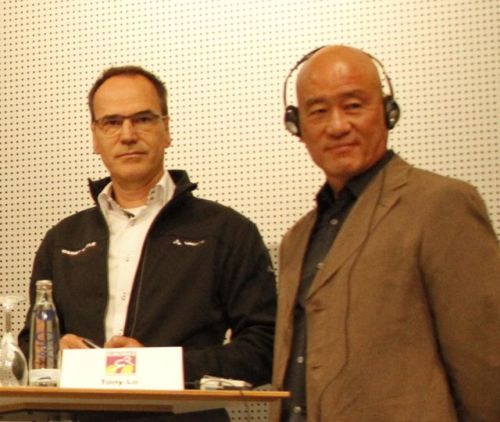FRIEDRICHSHAFEN, Germany (BRAIN) — Despite bad weather that dragged down bike sales this spring, industry leaders speaking on a panel Tuesday at Eurobike are optimistic about the spark electric bikes and new technologies will continue to provide the German market.
“Weather is responsible for sales and economic trends in Europe,” said Mathias Seidler, CEO of Derby Cycle. “The months of March, April and May we had a really difficult situation in trade. Subsequent orders stopped because nothing sold. The only sales that worked were electric bikes.”
Seidler said the situation has put pressure on the trade and retail, resulting in pricing campaigns and discounts. But, he added, German sales picked up this summer due to beautiful weather. “Really seldom have we had a year where the whole industry said July was the best month—it shows how difficult the spring was,” he said.
Siegfried Neuberger, manager of German Bicycle Industry Association ZIV, shared sales figures supporting those comments. Through June, German domestic supplies were down 7 percent compared to the same period in 2012. German production held steady in the first half of the year with German manufacturers producing 1.65 million units, a decrease of 2.4 percent compared to the previous year. Of those bikes German manufacturers produced, exports rose by 9.3 percent to 790,000 bicycles and e-bikes.
Neuberger said ZIV expects sales to improve as a result of the past two months to wind up the year 2 to 3 percent below last year. And despite a damaging consumer report published earlier this season that negatively impacted e-bike sales, ZIV expects that electric bikes will continue to grow as a percentage of the overall market. The annual market share of electric bikes is about 11 to 12 percent of all bikes sold in Germany, with about 430,000 units sold annually.
Tony Lo, CEO of Giant, noted the global appeal of electric bikes. For example, he said, Japan has been selling e-bikes for more than 20 years and e-bikes now account for about 450,000 units a year or 6 percent of the total market. In China, half of the bicycles being ridden are electric, most of them powered by throttle not pedelecs. “We believe e-bikes will continue to be popular in many countries,” Lo said. “In the long run, it is possible the e-bike will become more sporty, recreational and maybe create a new market.”
Despite market challenges, industry leaders are optimistic about the long-term future of cycling. Seidler noted that the German specialty retail channel remains strong, with nearly 60 percent of units and 80 percent of sales generated at bicycle retailers. And he added that the industry continues to innovate with new technologies such as hydraulics, electronics, carbon and lightweight design. “If you look at catalogs of 10 years ago, you see how products have changed. Average price has doubled. And product performance is much better. The industry is very lively and that will stay the same,” he said.
Eurobike project manager Stefan Reisinger concurred that the industry remains very vibrant and that’s reflected in this year’s trade show participation. The show, which opens Wednesday, has a record number of exhibitors this year with 1,280 companies coming from 55 nations around the globe.




